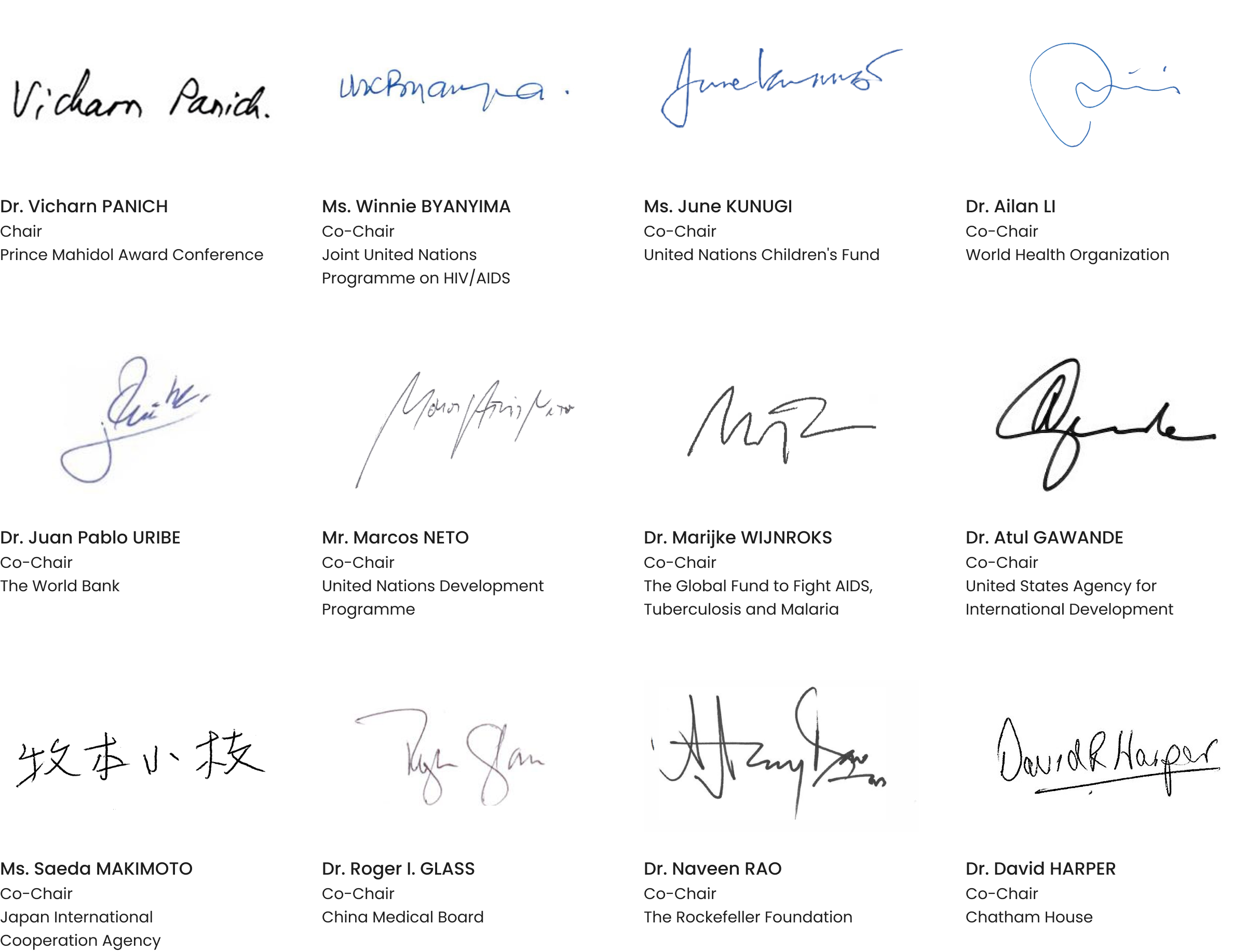

28 January - 2 February 2025
Centara Grand and Bangkok Convention Centre at CentralWorld in Bangkok, Thailand.
Message from the Co-Chairs of the International Organizing Committee
As the world navigates the transformative landscape of artificial intelligence (AI) and digital health technologies,
we stand at a crucial juncture with potential to redefine the future of global health and how people access
services. AI is an incredible opportunity to revolutionize healthcare, address skilled workforce gaps, advance
science and optimize resource allocation. Yet, with these possibilities also comes the responsibility to ensure
that AI and other emergent technologies are developed and deployed in ways that are safe, ethical, and
equitable. The apparent potential is matched only by the magnitude of the risks of harm, inequity and bias from
the irresponsible or malicious use of these technologies.
In line with the recently adopted Pact of the Future which includes a Global Digital Compact and our common
vision of "health for all, all for health," we aim to support countries in deploying AI and other technologies to
accelerate progress in achieving universal health coverage (UHC), the Sustainable Development Goals (SDGs)
and the pledge to leave no one behind. The PMAC 2025 will serve as a vital platform for this purpose, to foster
collaboration, dialogue, and action that ensures AI enhances health equity and improves health outcomes for
everyone, everywhere. This convergence of public health experts, domain leaders and policymakers, together
with civil society, faith-based groups, youth leaders and industry specialists allow us to address difficult and
controversial topics and build a vision for the future of technology-assisted healthcare, while identifying the risks
and establishing a roadmap to mitigate them. This dialogue deliberately builds on prior PMAC conversations,
including the 2022 and 2023 themes of the ‘world we want’ (towards a sustainable, fairer and healthier society)
and the triple planetary crisis – climate change, biodiversity loss, and pollution.
As AI systems develop, we must all be vigilant about the risks associated with poor governance or
implementation and the potential to exacerbate inequalities. These risks also include introducing ethical
challenges and creating barriers to appropriate care, not to mention the intrinsic resource-intensity of AI –
contributing substantially to the carbon footprint of health systems and technologies. It is imperative that we
develop strong regulatory frameworks to address these challenges, ensuring that AI systems promote human
dignity, fairness, and justice, while supporting global efforts to achieve UHC and the SDGs.
We must work together to build sustainable, evidence-based AI ecosystems that meet local needs and global
standards. Several high-level bodies have been formed at the national and global levels to address these issues
– including the UN Secretary-General’s High Level Advisory Board on AI. Our guidance on AI calls for a
collaborative, multi-stakeholder approach involving governments, technology developers, healthcare providers,
UN partners and communities to foster trust in AI technologies, while emphasizing the importance of robust
governance frameworks, transparent and explainable AI models, and inclusive policies that protect human
autonomy, data privacy, and security.
The PMAC 2025 will a key opportunity to advocate for this multi-stakeholder approach and harness the
technologies in an age of AI for a better world. We envision a future where AI is used responsibly to strengthen
healthcare delivery, but also empowers individuals and communities to take charge of their health, promotes
health equity, and enhances global health resilience.
Our discussions will revolve around three key sub-themes: (a) Technological Innovations to Strengthen Health
Systems and Achieve Universal Health Coverage, (b) Equity, Ethics and Empowering the Vulnerable; and (c)
Governance, Policy, and Stewardship. We will explore how AI and digital technologies can contribute to
strengthening health systems and reducing health inequities, while upholding ethical standards and promoting
inclusiveness and equity. We hope to stimulate a rich discourse that remains grounded in field realities,
especially considering low-resource settings and the billions of adults and children still living in disconnected
communities, seeking to meet their basic health needs.
We invite all participants to engage actively in the discussions, debates, and knowledge-sharing opportunities
that PMAC 2025 offers. Together, we have the power to shape a future where AI is leveraged responsibly and
effectively to enhance health systems, achieve UHC, and foster sustainable development. Let us collaborate to
build a healthier, fairer, and more resilient world.
The Chairs extend their sincere appreciation to the many individuals and organizations whose efforts have made
this conference possible. We especially thank the Prince Mahidol Award Foundation, the Royal Thai
Government, and the PMAC Secretariat for their exceptional support and leadership. We also acknowledge the
invaluable contributions of our speakers, panelists, and participants, whose expertise and passion will enrich
PMAC 2025.
We look forward to welcoming you to PMAC 2025 and to the collaborative efforts that will shape a brighter
future for global health.
Welcome all to Bangkok!
Sincerely,
Co-Chairs of the Prince Mahidol Award Conference 2025
We look forward to welcoming you to Bangkok!


